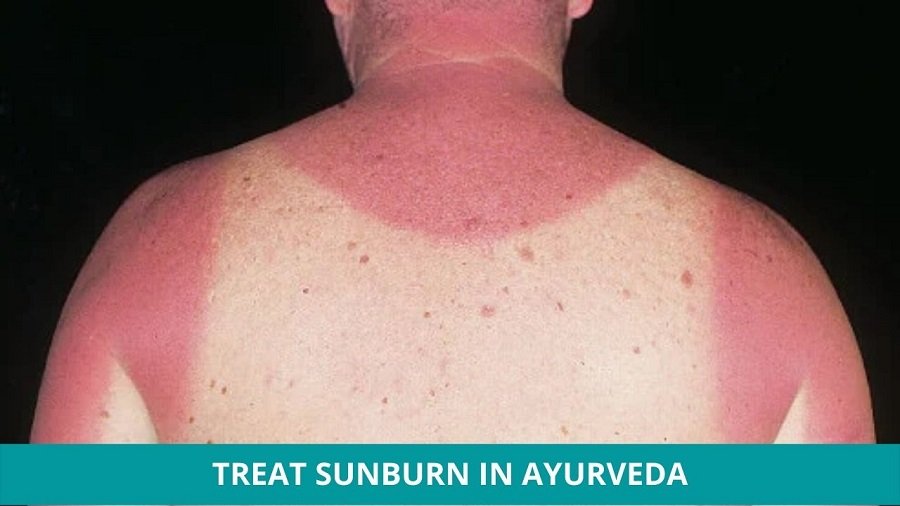Who wouldn’t like to get some sunshine during the harsh winters? But are you aware of the damage that the sun’s direct rays can cause to your skin? If not, then this article will help you learn all that you need to know about sunburn, its causes, symptoms, preventive measures, and Ayurvedic Treatments of Sunburn.
What is a Sunburn?
A reddish, rash-like patch on the skin, which is caused due to excessive exposure to the sun for long durations is defined as a sunburn. The ultraviolet rays of the sun are majorly responsible for causing sunburns, which appear after a few hours of excessive exposure to the sunlight. Suburbs cause burning, painful and itchy sensations, and are often hot to the touch.
A sunburn further increases the chances of developing rough and dark spots, and wrinkled, dry, and patchy skin. It also puts one at higher risk of getting Melanoma, a skin cancer.
Causes of Sunburn
As described above, sunburns are caused due to exposure to the ultraviolet rays of the sun for long durations. The UV rays may be from artificial sources such as tanning beds or sunlamps, or from sunlight.
Melanin, the dark pigment that gives the skin its color, also protects it from UV rays. When exposed to these rays, the body begins to produce this pigment faster and in reaction, melanin leads the skin to tan, which is a protection against the UV rays. But the protection goes to a limit and beyond that, the rays burn the skin causing sunburns.
The intensity or timing of sunburn depends on the following three factors:
- The intensity of the sun.
- Skin type.
- Duration of sun exposure.
Risk Factors of Sunburn
Now, let us take a look at the factors that might increase the risk of getting a sunburn:
- Working outdoors surely increases the chances of getting a sunburn.
- A combination of outdoor recreation and alcohol consumption.
- Vacation in a sunny, warm, or high-altitude location.
- People with blonde or red hair, light skin, and blue eyes are at a higher risk of getting a sun tan or sunburn.
- Wet skin tends to get burned faster than dry skin, which is why swimmers often have burnt skin patches.
- Directly exposing the skin to UV rays, that is without sunscreen protection.
- Photosensitizing medications also cause sunburns.
Complications of Sunburn
Frequent sunburns and excessive and repetitive exposure to UV rays can aggravate skin conditions and give rise to further complications and skin damage. These complications include:
- Premature Aging of the Skin: repeated sunburns and skin problems can lead to premature aging of the skin, which is called photoaging. This leads to:
- Rough and dry skin.
- Reduced skin strength and elasticity due to the weakening of connective tissues.
- Visibility of fine red veins on ears, nose, and cheeks.
- Discolored or dark spots also called solar lentiginous to develop on the face, arms, and hands.
- Freckles begin to show on the face and shoulders.
- Skin Cancer
- Eye Damage
- Precancerous Skin Lesions
Symptoms of Sunburn
Typical symptoms of sunburn include:
- Small fluid-filled blisters, which might often ooze.
- Tenderness on the skin.
- Painful to touch.
- Change in skin tone, pinkish or redness.
- Painful and teary eyes.
- Nausea, fatigue, headache, and fever.
- Swelling
Parts of the body that are covered by clothing may also be affected by UV rays, as the rays might penetrate through the open or loose weaves of the clothing.
Eyes are also extremely sensitive to ultraviolet rays and can burn due to its effect.
Preventive Measures in Sunburn
Methods that can effectively help you in avoiding sunburn are:
- Avoid tanning beds.
- Avoid exposure to the sun between 10 to 4 am.
- Use a generous amount of sunscreen and use it frequently.
- Properly cover up before setting your foot outside especially during the day, even if it’s a cool, hazy, or cloudy day.
- Always prefer wearing sunglasses when going outdoors.
- Take special care of toddlers and babies.
Ayurvedic Treatment of Sunburn
For centuries, Ayurvedic treatment and remedies have been acknowledged for their effectiveness. Application of certain herbal mixtures, home ingredients, and herbal pastes and combinations can greatly help in providing relief from sunburns. Few Ayurvedic treatment procedures for treating sunburns are:
1. Aloe Vera:
Aloe vera in its natural form is most beneficial and must be applied directly over the affected skin. In summers, it helps in hydrating the skin when consumed in the form of juice.
2. Turmeric and Sandalwood:
This magical combination contains both anti-inflammatories, as well as cooling properties respectively. When applied to the skin in equal proportions along with rose water, it helps in providing great relief from the burning sensations of sunburn and also helps the skin to glow.
3. Watermelon:
Besides the numerous benefits of this super fruit of summer, the rind of the fruit when rubbed against the sunburn from the fleshy side provides great relief and a healing effect to the skin.
4. Lemon Juice and Cucumber:
The cooling properties of cucumber help in reducing the pain and burning sensations caused by sunburn. A combination of crushed cucumber along with two tablespoons of lime juice must be applied over the affected skin, left for 15 minutes, and then must be washed with cool water for best results.
5. Coconut Oil:
The natural benefits of coconut oil are numerous, and one of them is the soothing and cooling effect when applied to any kind of skin condition.
Conclusion
Sunlight and sunshine when taken in proper and protective measures can be a boon for the body. Make sure you keep the above-mentioned points and measures in mind when you step out in the sun next time.
To get further assistance and guidance regarding sunburn or any other skin conditions, allergies, or problems, contact us, where our team of medical experts and Ayurveda specialists provide personal consultancy and assured treatment techniques to help you cure various ailments.







